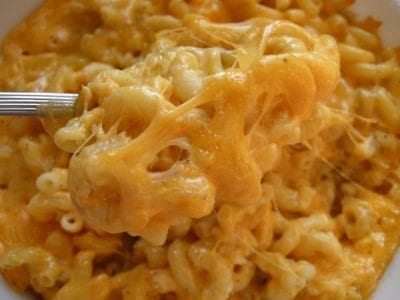"Yes, yes, that's right!" I said, cringing in disgust. "Ugh, that song is awful!"
A quick Google search and he'd pulled up the video his phone. Grinning, he held it up so I could see Richard Marx's coiffed hair.
"Ugh," I said, "look at that. The cheese is practically dripping out of your phone, there's so much cheese in that song."
After he realized that his phone was not leaking actual cheese, he laughed. "Yeah, that is pretty much as cheesy as it gets."
That's when the word "cheesy" struck me. "You know," I said. "I like to eat cheesy things. I think they're pretty great, in fact. So I wonder how 'cheesy' came to be a bad thing."
"Huh," he said. "Yeah, I wonder."
Thus another Daily Apple was born.
- The first meaning of cheesy is the good one: "Of or belonging to cheese; abounding in cheese."

French onion soup with Gruyere on top can be ridiculously cheesy.
(Photo and recipe from Closet Cooking)

Of course there's also cheesy pizza.
(Photo from f0o0od.tumblr)

And we certainly can't forget cheesy mac & cheese.
(Photo and recipe from Christy Jordan's Southern Plate)
- See? Abounding in cheese can be pretty fantastic.
- The second meaning of cheesy is a little less appetizing: "Resembling cheese in appearance, consistency, etc."
- For whatever reason, the things that have a cheesy appearance seem to more often resemble the cottage cheese variety rather than the hard cheeses. For example, will making soap, the stuff you mix together at one point would take on a cheesy consistency.
- Or, within this meaning, is the pathological sense of cheesy, meaning that something about a person's body is cheesy, or cheese-like. I don't want to gross you out to smithereens, so I won't go into detail. I'll just say, think infections, and move on.
- The third meaning is where we start getting into the slang. My Oxford English Dictionary says that this slang usage of the word meant "fine or showy." They speculate that it derived from the second meaning, resembling cheese. So, still thinking of cheese as a good thing, if you called someone or something cheesy, you'd be saying, hey, that looks pretty fine.
- Their example of the word in context is from 1858. (Specifically, the sentence reads, "To see him at Tattersall's sucking his cane, his cheesy hat well down on his nose." So very British.)

This is the sort of image that comes to my mind with this meaning: a British fellow nattily dressed with a sleek top hat on his head, and rather proud of his appearance too. This guy happens to be W. F. Candy, who in 1910 was the first captain of the University of Pretoria's soccer club.
(Photo from the University of Pretoria)
- This is where the OED entries stop. But here's where the Online Etymology Dictionary comes in. He thinks that our present slang meaning of cheesy, as in "cheap or inferior," is an ironic reversal that came after the "fine or showy" sense.
- You know how it is. For about a generation or so, people use one term to indicate that something is really great. Then the next set of teen-agers come along and they decide that they hate what the previous group thought was great, so they use the same word but to them, it means its opposite. Like how "hippie" at one time meant a person who was iconoclastic, counter-cultural, and daring. Now people use it with all sorts of scorn and derision, meaning a person who is stupidly idealistic, outdated, and also unwashed and therefore a bit dirty.
- Similarly, what in 1858 in Britain was fine or showy, in 1896 in the United States was cheap or inferior.
- Some dictionaries also add to this last slang definition, "blatantly inauthentic." To me, that's the one that captures best the true height of cheesiness, the uber-Richard-Marxness of cheese. Total and utter Velveeta, as it were.

Velveeta when unwrapped. Kraft says it is technically "Processed pasteurized cheese food."
(Photo from Paco Does Bacon)
- I suppose that's the fundamental difference in the two general usages of cheesy. The first sense uses actual, for-real cheese and is therefore delicious. The second sense uses processed cheese, Velveeta, American slices which are so not cheese but are rather some congealed mass of oil and other stuff masquerading as cheese. It's icky and full of all kinds of fakery and not good for you. But a lot of people like it anyway.

To get to the slice, you have to peel away the two slices of cellophane. This has always made the pseudo-cheese inside to be just another form of cellophane, only slightly more yellowy and rubbery.
(Photo from--believe it or not--Gourmet magazine)
I couldn't leave you hanging with the bad kind of cheesy. Here's some good cheesy:

This grilled cheese is made with homemade boule bread, sharp Cheddar, Dijon mustard, and about a half teaspoon of horseradish. With butter on the outside so it grills up nicely. Mmmm.
(Photo and recipe from Mad Mad Me)
See also: grilled cheese sandwiches
Sources
My Oxford English Dictionary, without which so many of these entries would not have been possible
Online Etymology Dictionary, cheesy
No comments:
Post a Comment
If you're a spammer, there's no point posting a comment. It will automatically get filtered out or deleted. Comments from real people, however, are always very welcome!